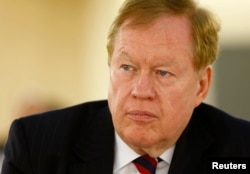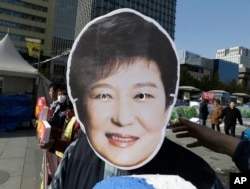The U.S. and South Korea are continuing to prioritize efforts to prosecute North Korea for alleged widespread human rights violations, despite shifting political landscapes in both countries that could minimize support for the issue.
On Wednesday Tomás Ojea Quintana, the new United Nations Special Rapporteur for North Korean human rights, met with South Korean Foreign Minister Yun Byung-se in Seoul to consult on plans to again bring a resolution before the United Nations Security Council next month to refer North Korea to the International Criminal Court for crimes against humanity.
The resolution was first passed in 2014 by the General Assembly but has stalled in the Security Council, where the North’s allies China and Russia would likely veto the measure if brought to a vote.
Earlier in 2014, a U.N. Commission of Inquiry issued a report comparing ongoing atrocities in North Korea to those committed by Nazi Germany, and documenting a network of political prisons in the country incarcerating nearly 120,000 men, women and children, as well as widespread and systematic abuses that include torture, enslavement, rape and murder.
Robert King, the U.S. Special Envoy for North Korean Human Rights, is also in Seoul, where he talked about the importance of continuing to pressure Pyongyang to institute basic civil liberties and protection reforms, and bring to justice those responsible for the atrocities committed.
“The North Koreans are going to have to deal with this problem of their human rights record, how they are recognized, how they are seen by the international community and also how their own people are becoming aware of what is being said about North Korea,” he said.
Little impact
North Korea has for the most part ignored or contested international condemnation over its human rights situation.
On Tuesday, North Korean Counselor Ri Song Chol voiced his country’s opposition to another U.N. measure encouraging the Security Council to take action against the Kim government.
Chol said the resolution was "full of lies, fabrications," and he called it "an illegal and unlawful document, a plot, which is not worth ... consideration."
Trump
The recent election of Donald Trump as the next U.S. president has raised questions over whether his administration will prioritize support for human rights abroad.
As a candidate, Trump downplayed allegations of abuses by Russia’s Vladimir Putin, Syria’s Bashar al-Assad and Turkey’s Recep Tayyip Erdogan.
On North Korea, Trump said he would be willing to meet informally with North Korean leader Kim Jong Un without any pre-conditions. He also said he might disengage and pull American troops from South Korea unless the South Korean government agreed to pay more for defense costs.
As President-elect, Trump has reassured South Korean President Park Geun-hye of the U.S. commitment to defend allies in Asia.
Rights advocates are concerned the President-elect will be willing to overlook the North’s human rights violations and drop calls for further U.N. rebukes in exchange for stronger support from China and Russia to halt Pyongyang’s nuclear program.
“The policy on human rights in North Korea has gone a far way down the road at the United Nations and the international community. And so it is our hope that no one political leader anywhere in the world can just walk that consensus back,” said Phil Robertson, the deputy Asia director of the advocacy group Human Rights Watch.
Choi-gate
In South Korea, President Park is facing massive protests, plummeting approval ratings, and investigations into her potential involvement in impeachable offenses over an alleged influence peddling scandal involving her close friend, Choi Soon-sil.
Under pressure, Park has agreed to hand over much of her power to a new prime minister to be selected by opposition parties that hold the majority in the National Assembly.
Last year, some opposition leaders objected to a North Korean human rights bill on the basis that it will only further alienate the North, and make it more difficult in the future to find any common ground for compromise and cooperation. That measure was ultimately approved in parliament.
With Park’s isolation growing in South Korea and Trump’s rise to power in the U.S., North Korea analyst Van Jackson says the close alliance between Washington and Seoul could be in for some major changes.
“I mean completely a 180 degree policy shift on the peninsula is possible,” said Jackson, who is an associate professor at the U.S. Defense Department’s Asia-Pacific Center for Security Studies in Honolulu, but his views do not represent the positions of the U.S. government.
The U.N. sanctions imposed on North Korea this year refer only to its nuclear and missile test violations and not to human rights.
The U.S. however had cited human rights abuses as a cause for imposing additional unilateral sanctions against Pyongyang.
Youmi Kim contributed to this report.







